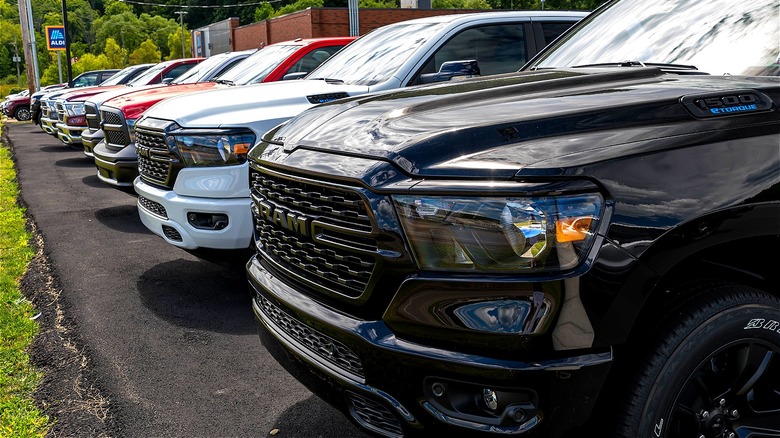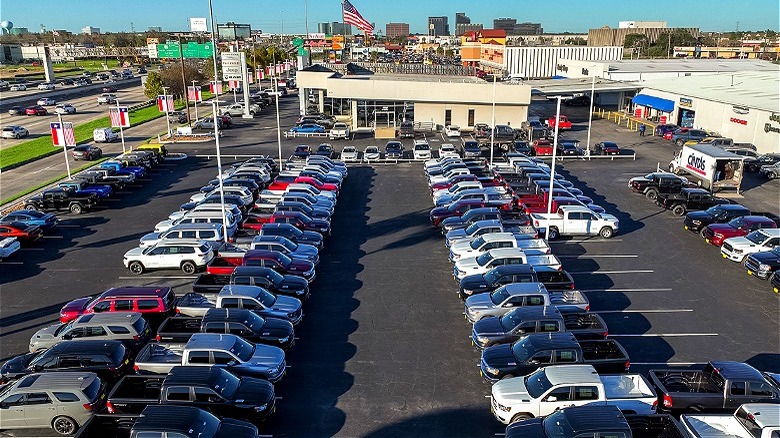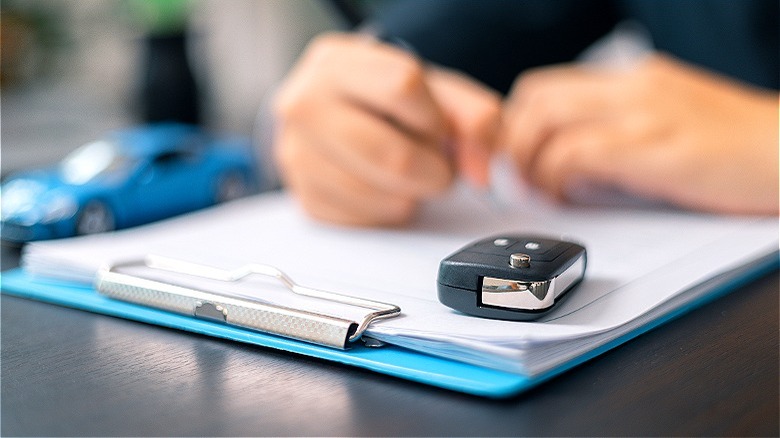You've Been Warned: Buying A New Car This Summer Is A Big Mistake
With interest rates holding steady and inflation still affecting consumer prices, you might have been holding off on buying a brand-new car (plus, new car prices in 2024 might have left you with sticker stock). However, despite promises that the Federal Reserve would cut interest rates three times in 2024, it's increasingly looking like the year might end without a single rate cut. With that in mind, you might feel like you've put off buying a new car long enough and could be deciding to go ahead with a purchase (with the hope you can potentially refinance later on). However, if you've decided to move forward with purchasing a new car you should know that doing so during the summer is not necessarily the best financial decision.
For starters, car retail prices start to trend downward during summer months. These prices start to drop because most dealerships need to make physical space in their lots for incoming new-year models (which typically arrive in the fall). Clearing out existing inventory can make receiving newer models easier, so consumers can expect to see better car prices in the late summer than they would earlier in the year. However, just because these prices have started to drop doesn't mean they're at their lowest. In fact, car inventories don't generally hit their lowest prices until the end of the year. This can make waiting to buy the smarter choice, especially if you're looking to get the best deal possible.
When to buy a new car
The bottom line is that, much like waiting for the best time to buy a new iPhone, it's better to wait until a newer car model exists before purchasing. Not only will a newer model ensure a lower price on the vehicle you want, but the longer you can wait out the dealership, the better your chances of snagging a better price. Yet, waiting until the end of the year can also have its drawbacks. Not only are you waiting even longer before you can have your new car, but you also aren't alone in waiting to purchase. The average amount of car sales occurring in December and January is usually 9% to 18% higher than in other months, meaning you could face stiffer competition, along with more limited inventory options.
The largest price cuts happen in December, largely due to dealerships (and salespeople) feeling especially motivated to hit their end-of-year sales target goals. This not only helps factor into the dealership's monthly sales volumes but can also ensure that individual salespeople get access to their annual bonuses. However, while the push is to sell as much as they can before the end of the year, there is a small window in January to keep in mind, too. As Tony Salerno, managing director and practice leader of automotive, advisory, and analytics at J.D. Power, explained to Newsweek, "While most brands implement December sales programs, it's important to note that most discounts run through the industry sales close day of January 2. Therefore, you don't have to worry about sacrificing your New Year's Eve celebration to finalize the deal on a new vehicle."
Other things to keep in mind
The month you buy your car aside, you could enjoy tax credits on your car purchase (made before the end of the year), especially if you're looking at electric vehicles. The IRS broadened some of its tax credit rules for EVs in 2024, so make sure the car you're looking at qualifies and ensure your dealer provides a time-of-sale report for your tax return.
It's important to keep in mind, though, that even with the extra savings from waiting to buy a car until the end of the year (versus the summer), a new car still might not be the best financial choice. According to data from Experian, the average loan amount for a new vehicle in the first quarter of 2024 was $40,634. Meanwhile, the average interest rate for a new vehicle during the same time was 6.73%, pushing the average monthly payment for a new car up to $735. While some might have the budget to afford this, others might want to consider pursuing used vehicles or even continuing to hold off on purchasing in the hopes of lower interest rates in 2025.
If, however, waiting to buy isn't an option, it could be worth looking at cash incentives as a way to avoid interest rates altogether. Making a higher down payment up-front can ensure you pay off the car in fewer years; this can help to mitigate increased interest rates. Similarly, looking for low-APR incentives can help you keep your monthly payments down. This said, remember that budget rules like the 20/3/8 car-buying rule aren't necessarily the best approach, so do what works best for your financial situation.


